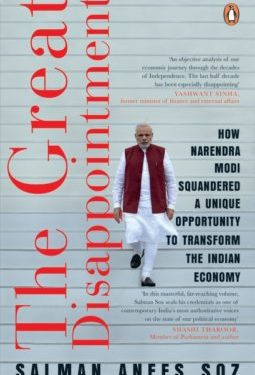New Delhi: Demonetisation was a terrible idea and the government’s own economic surveys have indicated that this move contributed to a slowdown in the economy, claims a new book.
‘The Great Disappointment: How Narendra Modi Squandered a Unique Opportunity to Transform the Indian Economy’ attempts to answer the overarching question of whether or not the Modi government transformed India’s economy and what the next government’s agenda should look like.
Written by economic and political commentator Salman Anees Soz, the book is also a critical assessment of five years of the brand of economics Modi has championed, often referred to as ‘Modinomics’.
According to Soz, demonetisation was a self-goal by the Modi government. “From ordinary people to experts, demonetisation has come in for withering criticism. I believe that if PM Modi’s electoral prospects are at all threatened in the 2019 Lok Sabha elections, demonetisation’s lasting impact will be partly responsible,” the writer has claimed in the book.
Soz has argued that for most economists and development experts, demonetisation did not achieve its initial objectives as a weapon against corruption, black money, terrorism or counterfeit money.
“It also did not make a significant advance in making India less cash dependent,” Soz has said in the book. “While I was convinced demonetisation would have an adverse impact on the economy, initially I thought it would be of a short-term nature. The initial costs of demonetisation appeared modest to some people. This was perhaps because the full extent of the unfolding crisis was unknown in the weeks following the announcement,” Soz has written in the book, which has been published by ‘Penguin Random House India’.
A year after demonetisation, it was becoming clear that the move was failing to meet its objectives, the author has claimed. “There is no concrete evidence to indicate that demonetisation led to a significant decline in terrorism,” Soz opined.
“Of course, it is one thing to argue that demonetisation largely failed to achieve its objectives and quite another to make the case that it had an adverse impact on the economy. However, even on this front, the evidence suggests that demonetisation was a terrible idea,” the book stated.
Soz also talks about GST in the book. In March 2017, 11 years after P Chidambaram first proposed it, the Modi government steered the GST through Parliament.
“The delay in implementing the GST was due to a lack of consensus between political parties and the state governments they controlled. One of the biggest opponents of the GST was PM Modi himself when he was Chief Minister of Gujarat. In his view, and he was not alone, producing states such as Gujarat and Tamil Nadu could lose revenues since taxes would now be based on consumption. With Modi and the BJP in power, it was easier to achieve consensus on implementing the GST,” stated the author.
“The Congress and other opposition parties were already in favour of it. Many experts predicted that economic growth could go up by as much as 1.5 percentage points in the event that the GST became law,” Soz further stated.
PTI






































